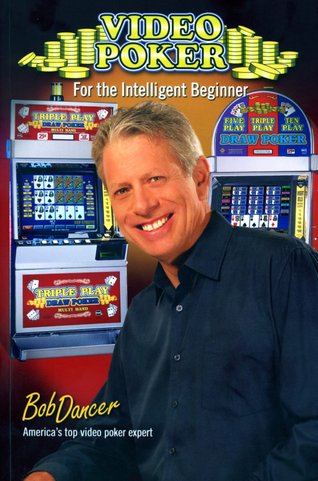
Bob Dancer’s book on video poker strategy.
Tuesday, Feb. 24, 2009 | 2 a.m.
TEST YOUR KNOWLEDGE
A few sample problems from “Video Poker for the Intelligent Beginner” by Bob Dancer:
1. In “9-6 Jacks or Better:” (a) Ks-Qs-3d-4d-5d vs. (b) Kd-Qd-2c-3c-4c
2. In “10-7 Double Bonus:” (a) Qs-9s-8s-Jd-3c vs. (b) Qd-9d-8d-Ts-3h
3. In “Full Pay Deuces Wild:” (W = any deuce) (a) W-W-W-6c-6h vs. (b) W-W-W-J- Jc
Answers:
1. In (a), hold the 3-4-5. In (b), hold the K-Q. The difference is the 2-3-4 contains an inside straight possibility; 3-4-5 does not.
2. In (a), hold Q-9-8-J. In (b), hold the Q-9-8. The extra high card in (a) is enough to make the difference between going for the inside straight and the straight flush.
3. In (a), hold just the three deuces. In (b), hold all five for the five-of-a-kind. The two extra cards available to make a possible wild royal flush in (a) are enough to make the difference.
Sun Archives
- Learning how to beat the odds (11-6-2006)
In the fine poker novel “Shut Up and Deal,” author Jesse May describes a fictional writer of instructional books named Larry Sandtrap, who appears as a disembodied voice in the mind of the main character, Mickey.
When Mickey was in a poker game, he would often hear Sandtrap intoning facts and figures about probabilities and statistics related to the hand in question. Sandtrap might praise a savvy move grounded in the math of the game but scold Mickey for a miscue such as abandoning sound poker strategy in favor of degenerate-style gambling at the table.
I’ve long considered Bob Dancer, the Las Vegas author and high-stakes professional gambler, a sort of Larry Sandtrap of the video poker world.
I know I hear Dancer’s “voice” (although I don’t think I’ve ever actually heard him speak) whenever I’m dealt aces full in the game known as “10-7 Double Bonus” and I throw away the full house, keeping only the three aces instead. Even though a full house is normally a strong hand, you see, the chance of making four aces and the accompanying high payout makes it a worthwhile strategy.
I also hear it when I throw away certain five-of-a-kind hands in Deuces Wild video poker that contain three deuces — yet keep others that look nearly, though not quite, identical. The value of three deuces in a hand can vary depending on what “cards” remain in the virtual deck, according to Sandtrap — er, Dancer.
That’s not the only reason I was eager to check out Dancer’s new book, “Video Poker for the Intelligent Beginner” (Huntington Press, Las Vegas, $24.95), however.
Dancer’s video poker products have a strong reputation for containing solid information.
Years ago I made a superb $29.95 investment in Dancer’s computer program designed for video poker practice. I still find it stunning that people risk real money on casino video poker, expecting to play perfectly by their “wits” alone, I suppose, without having mastered the game at home on this or a similar program. Then again, I still find it stunning when people stand on a soft 17, so I guess I’m the weird one.
My plastic pocket video poker strategy cards developed by Dancer and Liam W. Daily have absorbed so much use and abuse they have come to resemble baseball cards accidentally left in a jeans pocket and sent through the wash. Dancer’s memoir, “Million Dollar Video Poker,” featured a nice mix of gambling exploits and how-to information.
(Dancer evidently has had a work of fiction published that supposedly combines video poker and erotica. Really. So far I’ve opted to take a pass on that one.)
“Video Poker for the Intelligent Beginner” does not disappoint, scrutinizing standard games such as Jacks or Better, Deuces Wild, Joker Wild, Double Bonus and Double Double Bonus, and exploring variations such as Multi Strike poker as well as Quick Quads and other nontraditional 6-coins-per-line video poker games.
A chapter on progressive-style machines details how to evaluate games such as the popular Double Bonus progressive at the Palms that has meters on the royal flush, straight flush and four-of-a-kinds.
A discussion of video poker teams touches on casino “countermeasures” taken against skilled players and concludes that casino officials’ barring team members might be a good thing — “if they can get the actual team members and not others who are merely playing at the same time.”
A rundown of common player mistakes goes hand-in-hand with Dancer’s contention that video poker games with a potential payback of greater than 100 percent will be around for a long time. As long as people are ignoring inside straights in most games; holding the ace from a hand such as ace-queen-jack-7-4 in Double Double Bonus; and going for the royal instead of the flush in Double Bonus from a hand such as ace-king-queen-5-3 when all cards but the 3 are spades, casinos will continue to generate a profit from video poker. Such mistakes are devastating for the bankrolls of the players making them, but great for the house — and, indirectly, for expert players.
Some of the book’s most intriguing material falls under the category of “intangibles,” such as Dancer’s take on what makes video poker special. The bottom line is it’s “exploitable” — meaning a skilled, disciplined player who studies and puts in the hours can expect to turn a long-range profit.
“If I couldn’t win at the game, I wouldn’t play it,” Dancer writes. “For me, this is a very simple choice. The driving force for me is money, though I get a lot of pleasure from matching wits with a casino and coming out ahead.”

Join the Discussion:
Check this out for a full explanation of our conversion to the LiveFyre commenting system and instructions on how to sign up for an account.
Full comments policy